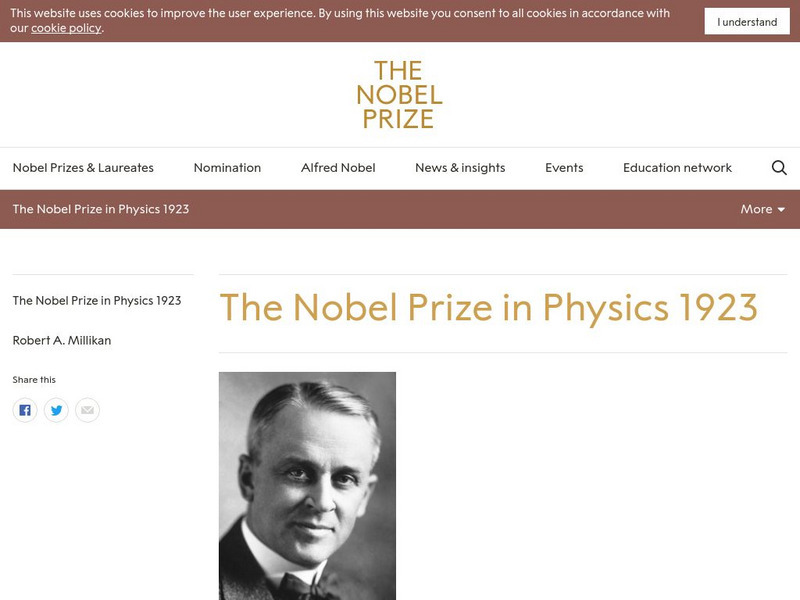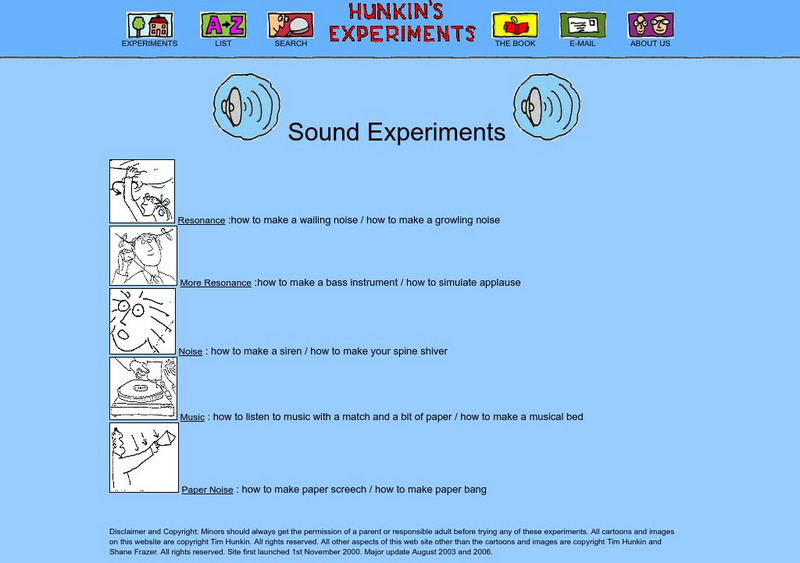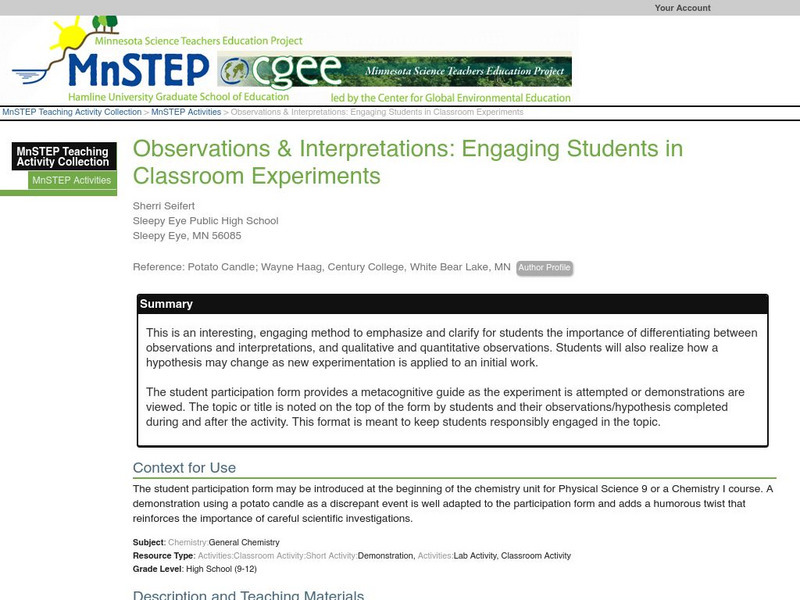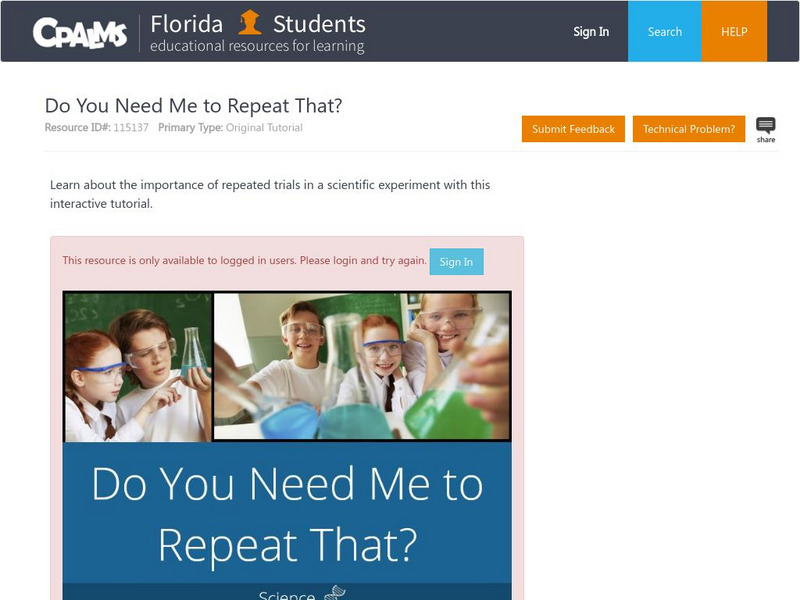Hi, what do you want to do?
TeachEngineering
Teach Engineering: Heave Ho!
Students will discover the scientific basis for the use of inclined planes. They will explore, using a spring scale, a bag of rocks and an inclined plane, how dragging objects up a slope is easier than lifting them straight up into the...
Nobel Media AB
The Nobel Prize: The Nobel Prize in Physics 1923: Robert Andrews Millikan
This Nobel website on the life and scientific work of Robert A. Millikan includes a biography, images, and internet resources for further reading and research. Also included are the 1923 "Presentation Speech" which praised Millikan's...
Vision Learning
Visionlearning: Practice of Science: Introduction to Research Methods
An explanation indicating that there is more than one method of scientific research.
Vision Learning
Visionlearning: Data: Uncertainty, Error, and Confidence
An explanation of how errors may affect data that has been collected for experimentation. Some examples are given.
Other
The Hastings Center: Ethics of Medical Research With Animals
A collection of articles from a variety of experts with differing points of view on the subject of using animals for scientific research. Beyond these nine articles, the site provides links to many additional studies on the subject,...
Nobel Media AB
The Nobel Prize: Thomas Hunt Morgan and His Legacy
This detailed article from the Nobel e-Museum explores Thomas Hunt Morgan's career and research in genetics. Read how Morgan's work influenced later scientists and the modern scientific world.
University Corporation for Atmospheric Research
Ucar: Elementary Globe: Earth System in a Bottle
If you have seeds at home, try this activity to help kids learn what a seed needs to grow. Students will create experimental conditions in terrariums to study what plants need to live. They will learn about the importance of the...
Hunkins Experiments
Hunkin's Experiments
Hunkin's Experiments is a group of simple cartoon illustrations of scientific principles. Some would work well in the classroom, but others have little value beyond entertaining students. All of the projects are easy to do and use...
Hunkins Experiments
Hunkin's Experiments: Ink
Hunkin's Experiments is a group of simple cartoon illustrations of scientific principles. Some would work well in the classroom, but others have little value beyond entertaining students. All of the projects are easy to do. This one is a...
Hunkins Experiments
Hunkin's Experiments: Sound Experiments
Hunkin's Experiments is a group of simple cartoon illustrations of scientific principles. Some would work well in the classroom, but others have little value beyond entertaining students. All of the projects are easy to do. This group of...
TeachEngineering
Teach Engineering: Students as Scientists
This curricular unit contains two lessons that let students actually do the work of scientists as they design their own experiments to answer questions they generate. In the first lesson and its associated activity, students conduct a...
Science Struck
Science Struck: What Is Experimenter Bias and How to Avoid It?
When doing research, it is important to be aware of one's biases and how to prevent them impacting on the design of an experiment or analysis of a research topic. Learn some techniques used to avoid bias in an experiment.
Khan Academy
Khan Academy: Swine Flu in Finland
In 2009, an outbreak of swine flu in Finland resulted in significant damage to the economy. Researchers investigated the potential cause of the disease. Through scientific experimentation, they were able to identify the disease as a new...
Alabama Learning Exchange
Alex: How Sweet It Is
As part of the study of Matter, the students will determine the density of standard percent sugar solutions through hands on experimentation. In laboratory groups, students will graph a standardized curve of the experimental data. The...
Science Education Resource Center at Carleton College
Serc: Observations & Interpretations: Engaging Students in Classroom Experiments
Use this method to emphasize and clarify for students the importance of differentiating between observations and interpretations, and qualitative and quantitative observations. Students will learn how a hypothesis may change as new...
Other
Csicop: Field Guide to Critical Thinking
This article, originally published in Skeptical Inquirer, outlines some of the key components of the scientific problem-solving process while addressing the many reasons for the popularity of paranormal beliefs in the U.S. (Published in...
Lumen Learning
Lumen: Boundless Biology: The Science of Biology
Explore the concept of scientific reasoning, and compare and contrast hypothesis and theories while understanding the difference between deductive and inductive thinking.
CPALMS
Florida State University Cpalms: Florida Students: Do You Need Me to Repeat That?
Learn how repeated trials during experimentation leads to more reliable results.
Lawrence Berkeley National Laboratory
Berkeley Lab: The E Xperiment Files
Discussion of the scientific method and the use of X-ray microscopy as an experimental technique. Explains the use of X-ray microscopy in the study of malaria.
Indiana University
Indiana University: Science vs. Non Science
This mini-lesson at the Evolution and Nature of Science Institute site from Indiana University provides a criteria by which students can evaluate an idea or explanation for scientific credibility.
Wikimedia
Wikipedia: Robert Hooke
Wikipedia offers biographical information on Robert Hooke (1635-1703 CE), one of the greatest experimental scientists of the seventeenth century.
Other
Latter Rain Page: Roger Bacon's Life, Works, Philosophy
Well-rounded biography of Roger Bacon with very clear explanation of his philosophy. The focus is on his belief that knowledge can be attained through scientific experiments and through divine inspiration. Includes brief excerpt from...
Other
Science Fair Primer: Reporting the Results
A good explanation of the elements of a good science fair report written by a high school science teacher. Details are given step by step on stating the hypothesis, explaining the experimental procedure, presenting the data attained, and...
Other
University of Richmond: Archimedes Initiative
The Archimedes Initiative is home to thematic videos on aspects of the inquiry cycle. With coverage of the ins and outs of science fair projects and video interviews of science fair participants who discuss their projects, discoveries,...

























